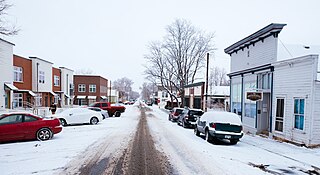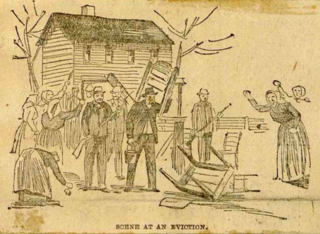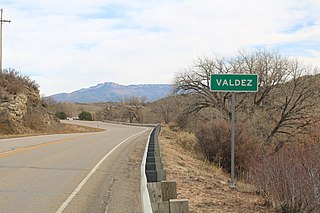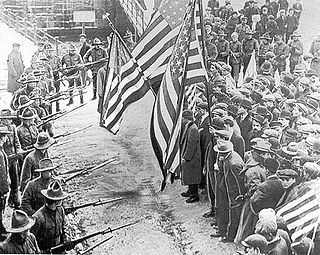Serene, Colorado is an extinct coal mining company town that was owned by the Rocky Mountain Fuel Company. [1] Serene was located at the site of the Columbine Mine and had company housing and a coal preparation plant. The Serene post office operated from January 25, 1923, until August 31, 1942. [2] Serene was the site of the Columbine Mine Massacre on November 21, 1927.
In 1927, Colorado coal miners conducted a statewide strike that had been called by the Industrial Workers of the World. The Columbine Mine at Serene was the only major coal mine in the state that continued to dig coal. In her book Once A Coal Miner, author Phyllis Smith described the company town of Serene:
The Colorado State Ranger Unit (the former "dry unit" from prohibition days) was summoned to prevent a demonstration by striking coal miners.
Some 500 protestors showed up at the mine on the morning of November 21. The confrontation between strikers and the militia unit resulted in the Columbine Mine Massacre, in which six miners were killed by machine gun, rifle and pistol fire.
Serene was located on rolling hills just west of the present-day Interstate 25 on State Highway 7, north of the State of Colorado Historical Marker that commemorates the Columbine Mine Massacre. The area that once was the company town of Serene is now a public landfill in extreme southwestern Weld County, within the town limits of Erie at 40°01′27″N105°01′33″W / 40.0242°N 105.0259°W .

The City of Lafayette is a home rule municipality located in southeastern Boulder County, Colorado, United States. The city population was 30,411 at the 2020 United States Census.

The Ludlow Massacre was a mass killing perpetrated by anti-striker militia during the Colorado Coalfield War. Soldiers from the Colorado National Guard and private guards employed by Colorado Fuel and Iron Company (CF&I) attacked a tent colony of roughly 1,200 striking coal miners and their families in Ludlow, Colorado, on April 20, 1914. Approximately 21 people were killed, including miners' wives and children. John D. Rockefeller Jr. was a part-owner of CF&I who had recently appeared before a United States congressional hearing on the strikes, and he was widely blamed for having orchestrated the massacre.

The region that is today the U.S. state of Colorado has been inhabited by Native Americans and their Paleoamerican ancestors for at least 13,500 years and possibly more than 37,000 years. The eastern edge of the Rocky Mountains was a major migration route that was important to the spread of early peoples throughout the Americas. The Lindenmeier site in Larimer County contains artifacts dating from approximately 8720 BCE.
The Columbine Mine massacre occurred in 1927, in the town of Serene, Colorado. In the midst of the 1927–1928 Colorado Coal Strike across the state, workers had been picketing one of the few remaining operating mines, in Serene. A fight broke out between Colorado state militia and a group of striking coal miners, during which the unarmed miners were attacked with firearms. The miners testified that machine guns were fired at them, which the state police disputed. Six strikers were killed, and dozens were injured.
Amelia "Mildred" Milka Sablich also known as Flaming Milka, was 19 years old when she became a leader in the 1927 coal strike in that state. Her family emigrated to Trinidad from Volosko, Croatia, in 1907. Her father, Anton Sablich, worked as a coal miner in Colorado.

Frank J. Hayes was an American miner and president of the United Mine Workers of America (UMWA) from 1917 to 1919. A Democrat, he also served as Lieutenant Governor of Colorado in 1937–39.
Early coal mining in Colorado in the United States was spread across the state. Some early coal mining areas are currently inactive, including the Denver Basin and Raton Basin coal fields along the Front Range. There are currently 8 active coal mines, all in western Colorado.

Anti-union violence is physical force intended to harm union officials, union organizers, union members, union sympathizers, or their families. It is most commonly used either during union organizing efforts, or during strikes. The aim most often is to prevent a union from forming, to destroy an existing union, or to reduce the effectiveness of a union or a particular strike action. If strikers prevent people or goods to enter or leave a workplace, violence may be used to allow people and goods to pass the picket line.

The Colorado Coalfield War was a major labor uprising in the southern and central Colorado Front Range between September 1913 and December 1914. Striking began in late summer 1913, organized by the United Mine Workers of America (UMWA) against the Rockefeller-owned Colorado Fuel and Iron (CF&I) after years of deadly working conditions and low pay. The strike was marred by targeted and indiscriminate attacks from both strikers and individuals hired by CF&I to defend its property. Fighting was focused in the southern coal-mining counties of Las Animas and Huerfano, where the Colorado and Southern railroad passed through Trinidad and Walsenburg. It followed the 1912 Northern Colorado Coalfield Strikes.

The Illinois coal wars, also known as the Illinois mine wars and several other names, were a series of labor disputes between 1898 and 1900 in central and southern Illinois.

The Coal Wars were a series of armed labor conflicts in the United States, roughly between 1890 and 1930. Although they occurred mainly in the East, particularly in Appalachia, there was a significant amount of violence in Colorado after the turn of the century.

The Morewood massacre was an armed labor-union conflict in Morewood, Pennsylvania, in Westmoreland County, west of the present-day borough Mount Pleasant in 1891.

Brodhead is an extinct coal mining town located in Las Animas County, Colorado, United States. The townsite is located at 37.4108°N 104.6764°W at an elevation of 6,919 feet (2,109 m). The Brodhead post office operated from August 14, 1902, until April 29, 1939.

Valdez is an unincorporated community and a census-designated place (CDP) located in and governed by Las Animas County, Colorado, United States. From 1907 to 1960, Valdez served as a company town for Colorado Fuel & Iron and its Frederick coal mine, the company's most productive and second largest. The population of the Valdez CDP was 46 at the United States Census 2020. The Trinidad post office serves the area.

Delagua is an extinct town in Las Animas County, Colorado, United States. The town site is about 5 miles (8 km) south of Aguilar. It served as a company-owned coal-mining town for the Victor-American Fuel Company. The Delagua post office operated from April 30, 1903, until May 31, 1954.

Anti-union violence in the United States is physical force intended to harm union officials, union organizers, union members, union sympathizers, or their families. It has most commonly been used either during union organizing efforts, or during strikes. The aim most often is to prevent a union from forming, to destroy an existing union, or to reduce the effectiveness of a union or a particular strike action. If strikers prevent people or goods to enter or leave a workplace, violence may be used to allow people and goods to pass the picket line.

Primero is a ghost town in Las Animas County, Colorado, United States. The community was a company coal mining town for the Colorado Fuel and Iron Company during the early 20th century.
Victor-American Fuel Company, also styled as the Victor Fuel Company, was a coal mining company, primarily focused on operations in the US states of Colorado and New Mexico during the first half of the 20th century. Prior to a 1909 reorganization, the business was known as the American Fuel Company.

Berwind is a ghost town in Las Animas County, Colorado, nestled in Berwind Canyon 3.1 miles (5.0 km) southwest of Ludlow and 15 miles (24 km) northwest of Trinidad. The settlement was founded in 1888 as a company town for the Colorado Coal & Iron Company and, from 1892, was operated by the Colorado Fuel & Iron Company. It was a battle site in October 1913 and April 1914 during the Colorado Coalfield War, housing a Colorado National Guard encampment during the latter stages of the conflict.

The 1927–1928 Colorado Coal Strike was a spreading strike, spearheaded by the Industrial Workers of the World. The exact number of workers involved is unclear due to the nature of the strike. However, it shutdown nearly all of Colorado's coal mines.